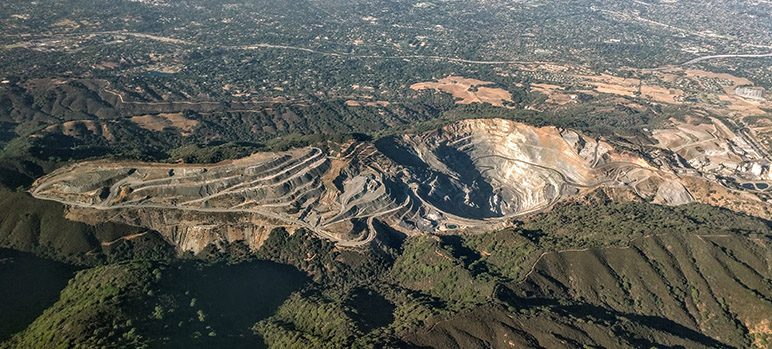With Lehigh Quarry under jurisdiction of so many public agencies, Santa Clara County Supervisor Joe Simitian will host a virtual town hall this week so residents can get all their updates about the controversial cement company in one place.
Some of the latest developments to be discussed in the 6:30pm Wednesday Zoom meeting include the ongoing saga between the Cupertino-adjacent aggregate mine and the county, which slapped Lehigh with violation notices for failing to control sediment runoff and comply with conditions imposed by a reclamation plan approved by the Board of Supervisors nearly a decade ago.
The county accepted the application as complete in November 2019. But Lehigh filed a lawsuit accusing the county of obstructing an application to amend its reclamation plan, which involves surface mining and which the company claims as a right vested by a permit obtained exactly a decade ago.
Simitian, whose district encompasses the quarry, used the word “perplexed” five times in a 12-minute phone call with San Jose Inside about the lawsuit.
“If Lehigh wants to change or amend their reclamation plan, they’re certainly entitled to submit an application, but they can’t be surprised that somebody has to determine whether those changes are consistent with the earlier determination on vested rights,” he said. “A vested right is not a blank check—it comes with limitations on the nature and extent of the operation.”
Simitian’s annual Lehigh town hall update—now in its sixth year—brings together representatives at the federal, state, regional and county level, to make sure everyone stays on the same page when it comes to oversight of Lehigh.
The company, one of the South Bay’s biggest polluters, has long drawn the ire of local residents and environmentalists.
In 2013, Lehigh reached a settlement with the Sierra Club requiring the quarry to cut selenium and other polluting discharge into the Permanente Creek within the next two-and-a-half years. The company also agreed to restore at least a few miles of the waterway, which the Sierra Club said had been dirtied and damaged by mining waste.
The Loma Prieta chapter of the Sierra Club says Lehigh has since failed to hold up its end of the legal settlement and that it should’t be trusted to expand with a second mining pit with that kind of track record.
Lehigh asked the county fin 2019 or permission to build its first new pit since the quarry opened in 1903. According to the application filed with the county, Lehigh would mine 60 million tons of limestone and aggregate from the 60-acre pit and plug up the old one after exhausting it by 2060.
The company has taken issue with the county’s characterization of those plans.
For example, an August 2020 memo from the county Department of Planning and Development states that Lehigh will increase total mining production by approximately 600,000 tons per year—something the company calls “demonstrably false.”
Lehigh officials say they also worry that the county is trying to chip away at its vested rights, which were recognized by the Board of Supervisors in 2011. The mining company claims that the new mining operations falls within the scope of those rights and thus should not be subjected to further review.
“The county Planning Department’s failure to perform its legal obligation to process our application, which the department deemed complete over a year ago in 2019, may undermine the quarry’s ability to operate and to plan for the quarry’s future,” Erika Guerra, Director of Environmental and Land Resource Management for Lehigh Hanson's West Region, said in a prepared statement.
When Lehigh—which supplies 70 percent of the cement in the county and just over half of the Bay Area’s—built its quarry in the Cupertino foothills in more than a century ago, the area was far removed from where almost anyone lived. But the city of Cupertino grew up around it and the cement plant now lies near residential neighborhoods, where denizens say it creates a lot of noise and pollution.
Regularly listed as one of the Bay Area’s heaviest polluters of mercury and additional toxins, Lehigh has drawn the ire from Cupertino residents like Rhoda Fry, who has been battling the cement plant for years.
A former member of Cupertino’s Environmental Review Committee, Fry said the county is doing the right thing by examining what Lehigh can and cannot do within the parameters of the 2011 permit.
“If Lehigh has vested rights, they can mine 24 hours a day,” she said. “If they don’t, then it would require a conditional use permit to mine, and there could be a number of restrictions, which obviously Lehigh does not want to have. There’s obviously a middle ground. But what the county is saying is that vested rights is not necessarily carte blanche for Lehigh. And Lehigh is obviously not happy about that.”
Cupertino, which lacks jurisdiction over Lehigh, has had its own issues with the company, threatening fines of $1,000 a day if the quarry didn't restore part of a back road it allegedly expanded without permission in 2018. Fry and Cupertino Mayor Darcy Paul said they’ll both be closely monitoring Lehigh’s situation with the county.
“I know that this is of utmost concern to our City Council,” Paul said in a statement, “and we are examining this with great interest to help ensure an outcome that respects the importance of public safety and responsible stewardship of the environment.”
Click here to sign up for the Lehigh community meeting.

